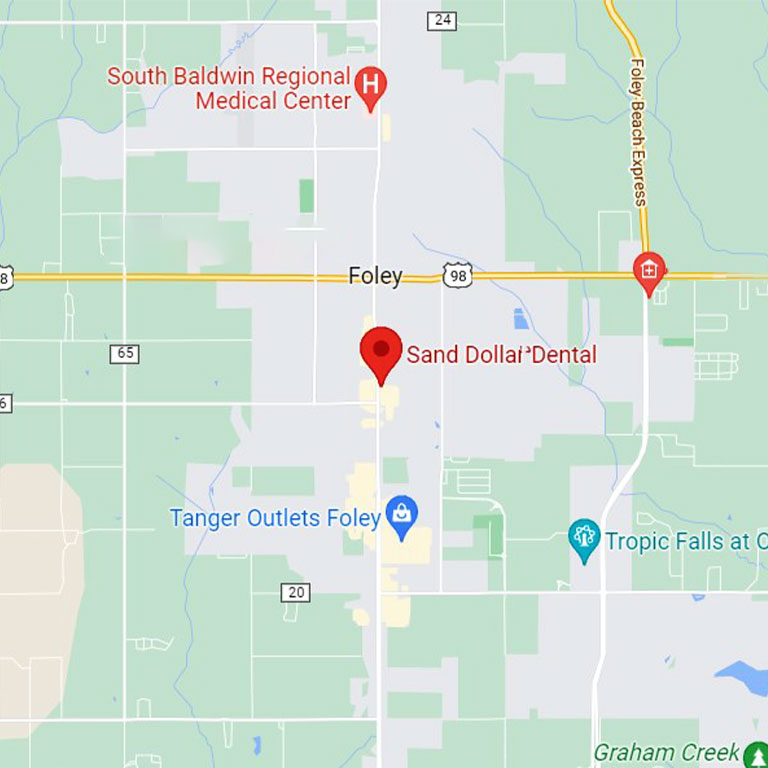Tooth Extractions in Foley, AL
Are you looking for a dentist in Foley, AL to diagnose your tooth pain? If so, you might need a tooth extraction. But what is tooth extraction and what is involved? Let’s take a look at the tooth extraction process, as well as the benefits and risks that come with it.
What Is a Tooth Extraction?
A tooth extraction is a dental procedure performed by a dentist. A tooth extraction involves completely removing a decayed or damaged tooth from its socket. This is sometimes referred to as “pulling a tooth.”
What Are the Benefits of Having a Tooth Extraction?
The benefits of having a tooth extraction are significant. A tooth extraction can help get rid of tooth pain, which, in turn, will get rid of any underlying infection that could spread and cause additional, more severe dental issues. Having a decaying or damaged tooth extracted will also help protect the rest of your teeth and gums from becoming diseased.
What Are the Risks of Having a Tooth Extraction?
It’s uncommon to experience problems resulting from a tooth extraction. However, on rare occasions, the following issues could occur.
- Nerve damage.
- Dry socket (when the blood clot in the tooth socket falls out after the tooth has been extracted).
- Infection.
- Pain or discomfort at the injection site.
- Slow healing.
- Damage to neighboring teeth.
- Bruising and swelling at the treatment site.
When Is a Tooth Extraction Needed?
A dentist will usually try to provide restorative dental procedures such as dental fillings or crowns before resorting to a tooth extraction. However, if a tooth is damaged past the point of repair, then a tooth extraction in Foley, AL is generally necessary.
In What Situations Is a Tooth Extraction Necessary?
- A deep infection in the tooth.
- Cavities resulting from extensive tooth decay.
- Dental injuries that damage the tooth beyond repair.
- Severe gum disease.
- A fractured tooth.
- Overcrowded teeth.
- Impacted teeth such as wisdom teeth.
Is a Dental Surgeon Required to Perform a Tooth Extraction?
A dental surgeon isn’t required to perform a tooth extraction. However, an oral surgeon or periodontist can perform a tooth extraction, especially if it’s a more complex situation. It’s more common, though, for a dentist in Foley, AL to perform tooth extractions from their dental clinic.
How Is a Tooth Extraction Performed?
In some cases, a patient might be asked to take antibiotics before undergoing a tooth extraction procedure. Once in the dental office or hospital dental clinic, the patient will be given a local anesthetic to numb the gums around the affected tooth. The dentist will then use a tooth removal tool called an elevator to loosen the tooth. The next step involves the dentist using forceps to pull the tooth out of its socket.
After the tooth has been removed, the dentist will clean out the socket, smooth out the remaining bone, then close the gum area using stitches (sutures). The patient will then be asked to bite down gently on a damp piece of gauze. This will help stop the bleeding and help a blood clot form. The gauze will then be removed; however, the patient might still experience some light bleeding for the first 24 hours.
How Long Does a Tooth Extraction Take?
While it seems like an extensive dental procedure, a tooth extraction only takes about 20-40 minutes or so. However, if more than one tooth is involved, the procedure will take longer.
How Long Does It Take to Recover from a Tooth Extraction?
The amount of time it takes to recover from a tooth extraction will depend on the complexity of each case. Most people will recover and be able to return to normal activities within a few days. However, it will take the jawbone several weeks to heal completely.
Can You Eat After a Tooth Extraction?
A patient should avoid consuming anything that involves chewing after having a tooth extraction. That means for the first few hours after having a tooth pulled, the patient should stick to liquid foods. After that, the patient should only eat soft foods such as eggs, pudding, oatmeal, pasta, rice, applesauce, mashed potatoes, soups, etc. for the first few days. Then, for the following two weeks after the procedure, the patient should avoid chewing on the extraction site as this will disrupt and delay the healing process.
What to Avoid After Having a Tooth Extraction?
After a tooth extraction in Foley, AL, the patient will need to avoid eating hard and crunchy foods. The patient should also avoid drinking through a straw as this could dislodge the blood clot and cause a dry socket condition. Additionally, patients should avoid strenuous activities for the first few days as this could cause post-operative bleeding and possibly an elevated heart rate. The dentist in Foley, AL will advise the patient when they can resume strenuous activities.
Other things that should be avoided after a tooth extraction include drinking hot liquids because this could increase swelling. It’s also recommended that patients limit alcohol use because excessive alcohol could slow the healing process. Smoking should also be avoided because smoking could break down the blood clot which could then lead to dry socket.
Are There Any Side Effects of Having a Tooth Removed?
Here are the most common side effects of having a tooth removed.
- Bleeding.
- Oral pain and discomfort.
- Minor swelling.
- Risk of infection.
- Tender mouth.
- Skin discoloration around the cheek and face.
Is Having a Tooth Extraction Painful?
A tooth extraction in Foley, AL can be painful. However, the dentist will administer a local anesthesia prior to the procedure. This will help eliminate the pain during the procedure. Following the procedure, most patients will still experience some pain, but that pain can usually be managed with over-the-counter or prescription pain medications.
Can You Brush Your Teeth with Toothpaste After Having a Tooth Extraction?
Most dentists recommend avoiding toothpaste, mouthwash, and other oral hygiene products for at least three days after having a tooth extraction. Instead, the patient can rinse their mouth with a saltwater mixture 2-3 times daily after meals. This will help clean and disinfect the mouth. However, the patient must be careful not to forcefully swish and spit out the saltwater mixture to prevent the tooth socket blood clot from becoming dislodged.
After the initial three days of using the saltwater rinse, the patient can then go back to using toothpaste and other oral hygiene products. However, it’s also recommended that the patient continue using the saltwater rinse 2-3 times daily for the following seven days. This is in addition to their normal oral hygiene routine.


